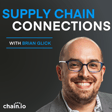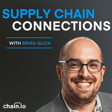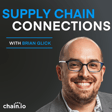
Episode 11 - Daniel Gardner, President of Trade Facilitators Inc.
SUPPLY CHAIN CONVERSATIONS
—————————————————
EPISODE 11 - DANIEL GARDNER, President of Trade Facilitators Inc.
—————————————————
Welcome to Profiles, a podcast centered around supply chain conversations hosted by Brian Glick, founder and CEO of Chain.io.
Our guest this week is DANIEL GARDNER.
Daniel is a global trade executive with a unique combination of 3PL, consulting and Beneficial Cargo Owner experience. He is fully bilingual (ESP) and a Licensed Customs Broker. He was awarded his MBA from the University of Miami. Daniel can also boast of being a multi-award winning professor of supply chain management, a Six Sigma Black Belt and the author of four books on global trade.
“…It’s hard to imagine that one could know everything that one needs to know about global trade, but that knowledge, which should always continue to grow, will come over time, you just have to be willing to work and listen.”
Listen in as Brian and Daniel discuss:
- How Daniel initially got into the supply chain industry having been bitten by the international travel bug.
- The diversity of experiences available for someone coming into the supply chain.
- The fundamental importance of education and keeping up with current Incoterms.
- Having a strong company policy and strategy around Incoterms can reduce risk.
- What influenced Daniel during his journey within the industry?
- How time flies, so really get on with the heavy lifting early on in your career. Never stop learning.
- Bridging the gap between analogue and digital and how it influences growth.
- You must ask to be given extra tasks and be willing to work hard when new in the industry to learn and grow.
“…ask questions and listen, and take notes where you can, because that’s going to broaden your frame of reference. Because, on a tactical level, at the end, and I mean operationally now, 80% of global trade is always different and changing, but a lot of it becomes repetitive.”
Resources mentioned in the show:
- Daniel Gardner - LinkedIn
- Trade Facilitators, Inc.
- TPM Conference
Subscribe to the podcast in iTunes or wherever you get your podcasts so that you’re updated when we post a new episode!
Take care, and until next time,
Brian Glick


